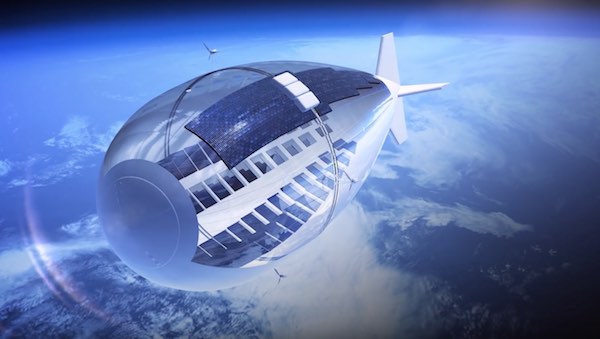
[Image above] Credit: Thales; YouTube
Thanks to a recent investment of €17 million of funds, a European aerospace company is on its way to build an autonomous stratospheric airship.
This is no old-time blimp, however—this solar-powered, stratosphere-flying ship is high-tech.
Thales Alenia Space—a French–Italian venture specializing in space communications, navigation, Earth observation, exploration, and orbital infrastructures—is developing the drone–satellite hybrid aircraft.
Called Stratobus, the huge braided carbon-fiber craft is designed to hover 20 km off the ground in the lower stratosphere, where it can perform wide-ranging surveillance operations over a range of 500 km.
According to Thales, “Stratobus will carry payloads to perform missions such as the surveillance of borders or high-value sites, on land or at sea (videosurveillance of offshore platforms, etc.), security (the fight against terrorism, drug trafficking, etc.), environmental monitoring (forest fires, soil erosion, pollution, etc.) and telecommunications (Internet, 5G).”
And Stratobus is no small ship—according to a Daily Mail UK article, Stratobus will weigh 5 tons and stretch out 100 m in length.
Even at those dimensions, however, the project still boasts portability. According to the article, “’The envelope can be folded up and placed in a 40-foot container, which means it was designed for easy transport.’
Plus, the project is green—when in operation hovering above the ground at 20 km, the ship will combat the ~55 mph stratospheric winds with a solar powered electric propulsion system to stay in position.
Solar panels on top of the balloon and solar concentrators inside the ship will collect maximum solar energy, which can be stored via the onboard fuel cells.
And for times when the sun isn’t positioned just right, the Stratobus will be equipped with a rotating ring around the balloon that adjusts the panels to continually maximize sun exposure.
Although €17 million of funding may seem like a steep investment for a drone–satellite hybrid, Thales obviously sees huge profit potential in such a craft.
“The new market for high-altitude pseudo satellites, or HAPS, is estimated at one billion dollars from now to 2020, but is awaiting a product. With Stratobus offering a field of view of 500 kilometers, we’re convinced that it will win a large share of this market,” Jean-Loic Galle, president and CEO of Thales Alenia Space, says on the website.
The team plans to build a demonstration vehicle by 2018 and perform qualification and certification flights in 2020.
Watch more about this unique project in Thales’ video below.
Credit: Thales; YouTube
